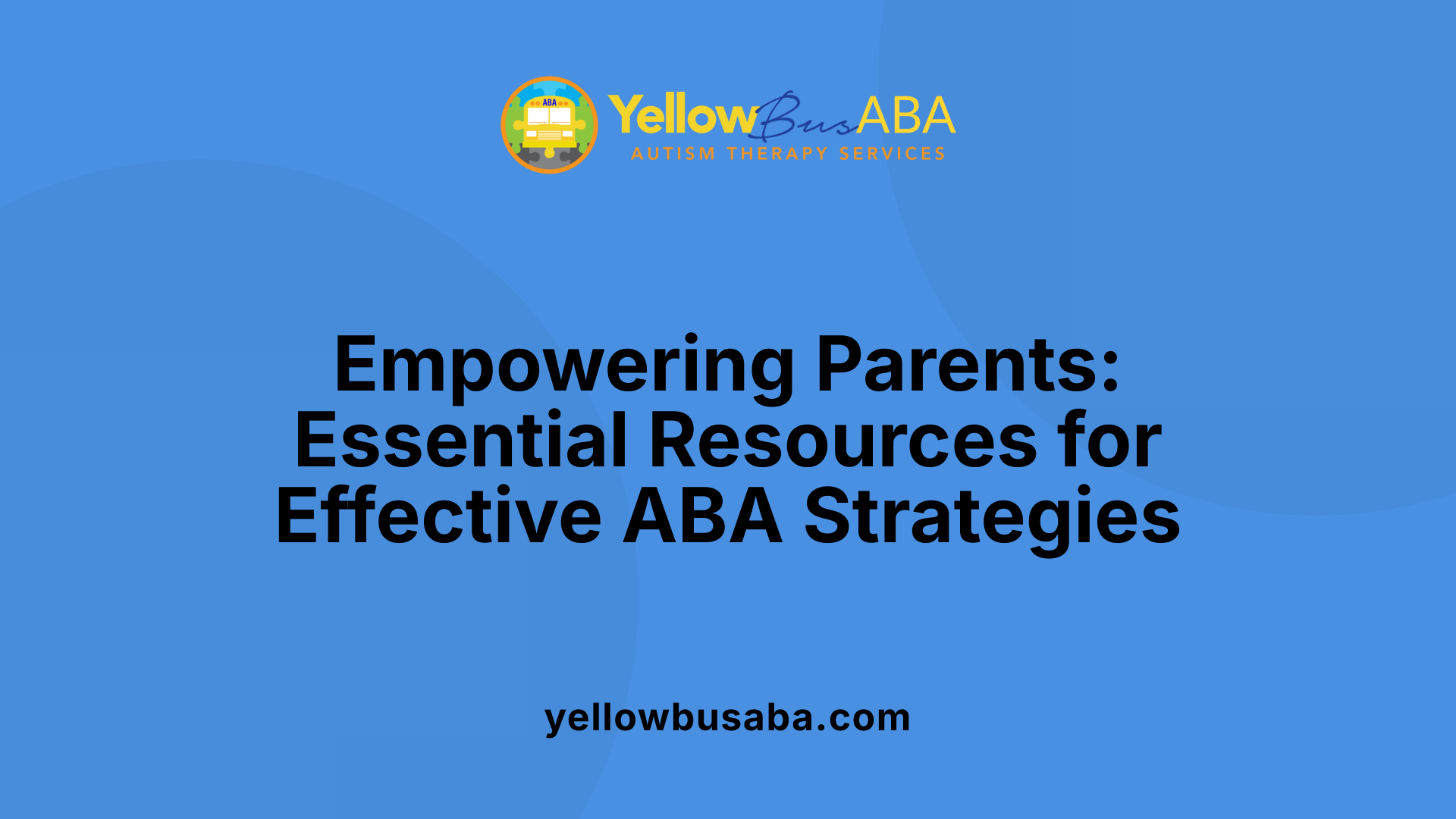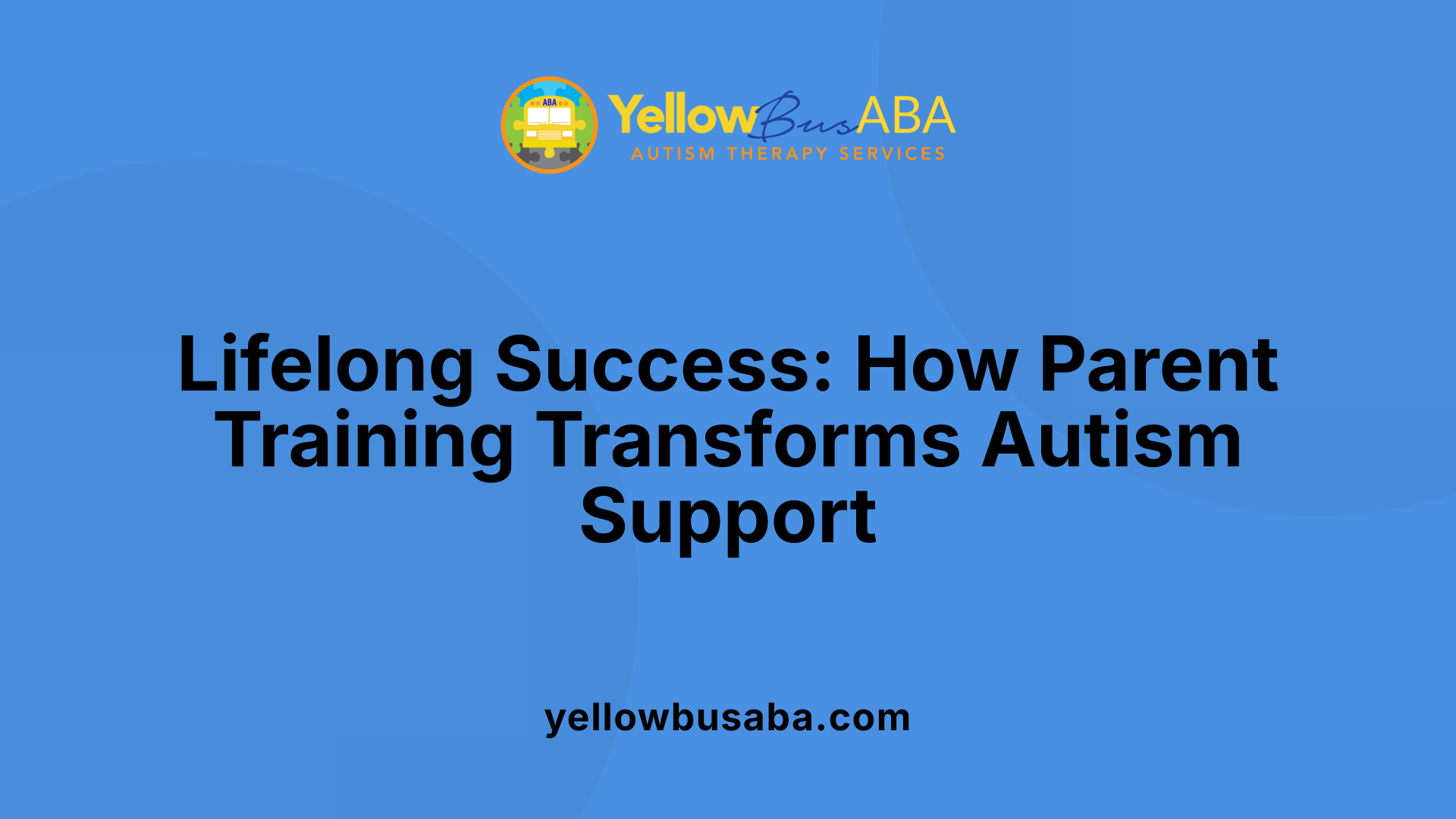Unlocking the Full Potential of Therapy
Parent training in Applied Behavior Analysis (ABA) is a cornerstone of effective intervention for children with autism spectrum disorder (ASD). This comprehensive approach equips parents and caregivers with essential skills, fostering long-term growth and development beyond clinical settings. By involving families directly, ABA parent training enhances the effectiveness of therapy, promotes generalization of skills, and ultimately supports children's independence and well-being.
The Role and Significance of Parent Training in ABA

What is the role and importance of parent training in ABA therapy?
Parent training is a vital part of Applied Behavior Analysis (ABA) therapy for children with autism spectrum disorder (ASD) and other developmental challenges. It equips parents, caregivers, and even extended family members with practical skills to support their child's growth and development outside the clinical setting.
This type of training helps families understand the core principles of ABA, such as positive reinforcement, discrete trial training, and communication strategies like PECS. By learning these techniques, parents can consistently implement behavioral strategies at home and in community environments, which enhances the likelihood of positive outcomes.
One of the main benefits of parent training is fostering collaboration between families and therapists. When parents are involved and well-informed, they can actively participate in setting goals, tracking progress, and adjusting interventions as needed. This teamwork builds trust and ensures that interventions are aligned with the child’s needs.
Furthermore, parent training supports the generalization of skills. Children are more likely to transfer behaviors learned in therapy to their everyday environments, such as school, home, and social settings. This is crucial for maintaining progress and promoting independence.
In addition to skill development for the child, parent training can reduce parental stress by providing confidence and clarity in managing behaviors. It empowers parents to handle challenging moments, encouraging a more harmonious family dynamic.
Overall, parent training strengthens the foundation of ABA therapy, making interventions more consistent, effective, and sustainable. It helps children achieve better communication, social skills, and independence while fostering a supportive environment for their growth.
Benefits of Parent Training Programs for Children with Autism
 Parent training programs within ABA therapy provide numerous advantages that significantly impact children with autism and their families. These programs focus on teaching parents and other caregivers effective strategies to support their child's development, leading to noticeable improvements in behavior, communication, and social skills.
Parent training programs within ABA therapy provide numerous advantages that significantly impact children with autism and their families. These programs focus on teaching parents and other caregivers effective strategies to support their child's development, leading to noticeable improvements in behavior, communication, and social skills.
One of the primary benefits is the enhancement of a child's ability to behave appropriately and communicate more effectively. Through techniques such as positive reinforcement, discrete trial training, and PECS, parents learn to encourage desirable behaviors and create an environment conducive to learning. These skills are not limited to therapy sessions but are consistently reinforced across various settings, including at home, school, and in the community. This consistency facilitates the generalization of skills, helping children apply what they learn in real-world situations.
In addition to skill acquisition, parent training promotes greater independence in children. By practicing learned strategies regularly, children can develop self-sufficiency, which can reduce their reliance on caregivers and diminish regression of skills. This continuous reinforcement ensures that progress is maintained over time.
Moreover, parent involvement fosters stronger bonds between parents and children. Effective communication, achieved through improved social and behavioral skills, enhances the overall quality of family interactions. Parental participation also helps reduce caregiver stress by equipping families with the knowledge and tools necessary to manage challenging behaviors confidently.
Research supports that parent training contributes to better treatment outcomes. It allows caregivers to grasp the functions behind certain behaviors, enabling more targeted and effective interventions. This collaborative approach not only improves children's developmental trajectories but also strengthens the family unit.
In summary, parent training programs in ABA therapy empower families, promote sustainable skill development, and foster a supportive environment for children with autism. These benefits underline the importance of incorporating such training into comprehensive intervention plans for long-term success.
Supporting Children and Families through Parent Training

How does parent training support children with autism and their families?
Parent training plays a vital role in helping children with autism and their families flourish. It equips parents and caregivers with the skills and knowledge needed to promote positive behavior changes and support their child's development. Through targeted programs like Applied Behavior Analysis (ABA) coaching, psychoeducation, and parent-mediated approaches, families learn practical strategies that can be applied in everyday life.
These interventions teach parents how to use reinforcement techniques, manage challenging behaviors, and facilitate communication skills. For example, positive reinforcement—rewarding appropriate responses—encourages children to repeat desirable behaviors. Discrete Trial Training helps children learn new skills through clear, brief instructions, gradually reducing prompts over time. The Picture Exchange Communication System (PECS) offers children with limited verbal skills ways to express themselves using pictures.
Parent training also assists families in navigating complex healthcare and educational systems. Care coordination, advocacy, and understanding treatment options empower families to make informed decisions and access necessary resources.
Research indicates that engaged parents often see improvements in their child's social, communication, and adaptive skills. These programs can reduce maladaptive behaviors, alleviate parental stress, and foster healthier family dynamics. In addition, training enhances children’s ability to generalize skills across different environments—home, school, and community—leading to more consistent progress over time.
Overall, parent training creates a supportive environment where children can thrive. By empowering caregivers with effective strategies and increasing their confidence, these programs positively influence long-term outcomes for children with autism.
Long-Term Outcomes and Successes in ABA Parent Training
What are the long-term outcomes and successes associated with parent training in ABA?
Research shows that parent training in ABA leads to lasting behavioral improvements in children with autism. These include reductions in problematic behaviors and significant improvements in communication skills. When parents are equipped with evidence-based strategies, they can implement consistent interventions across different settings, which helps children transfer skills from therapy sessions to everyday life.
One of the notable benefits of parent training is the promotion of skill generalization and child independence. Families that participate actively often see children develop the ability to manage tasks with less direct support, encouraging greater autonomy.
Parent training also has a positive impact on family dynamics. It fosters stronger bonds, enhances communication, and reduces parental stress. As parents gain confidence and competence, families tend to experience higher satisfaction and harmony in their daily interactions.
In the long run, these interventions support broader developmental goals such as social inclusion and overall growth. Additionally, investing in parent training can be cost-effective, decreasing the need for intensive professional services over time. This collaborative approach enables children to make sustained progress and helps families thrive.
| Aspect | Long-term Impact | Additional Details |
|---|---|---|
| Behavioral improvements | Reduced inappropriate behaviors, enhanced communication | Persist long after initial training; reinforced at home |
| Skill transfer and independence | Better generalization and daily life adaptation | Promotes autonomy in routine activities |
| Family well-being | Greater cohesion and reduced stress | Improved communication and shared strategies |
| Cost-effectiveness | Decreased reliance on professional interventions | Saves resources while supporting sustained progress |
Overall, parent training in ABA is essential for achieving enduring positive outcomes, supporting children’s developmental trajectories, and empowering families for lifelong success.
Developing Resources and Guides for Effective Parent Implementation
 Creating well-structured resources for parents is essential to support the successful implementation of ABA interventions at home. Clear, accessible educational materials help parents understand the core principles of ABA and how specific strategies can promote their child's development.
Creating well-structured resources for parents is essential to support the successful implementation of ABA interventions at home. Clear, accessible educational materials help parents understand the core principles of ABA and how specific strategies can promote their child's development.
Educational tools should include straightforward explanations of ABA concepts, such as positive reinforcement, discrete trial training, and picture exchange communication systems (PECS). Using visual aids like charts or progress graphs can make data more understandable, showing parents how behaviors change over time and the impact of different interventions.
To facilitate consistency, resources should guide parents on tracking progress with visual data and maintaining skill reinforcement routines. This includes advice on applying reinforcement techniques during routine activities like mealtime or play, helping children generalize learned skills across settings.
Effective parent guides also emphasize ongoing communication with therapists, encouraging regular updates and collaborative goal setting. Providing practical tips and examples in non-technical language can boost confidence and clarity, making it easier for families to integrate ABA strategies seamlessly into daily life.
Ultimately, comprehensive, easy-to-understand resources empower parents to support their child's growth, sustain behavioral gains, and foster a more cohesive approach to autism intervention.
Conclusion: Empowering Families for Lifelong Success
 Parent training interventions in ABA therapy play a vital role in supporting children with autism and their families. Studies show that these programs can lead to small to moderate improvements in ASD symptoms, especially when using approaches like DIR/Floortime, Pivotal Response, and parent-focused training.
Parent training interventions in ABA therapy play a vital role in supporting children with autism and their families. Studies show that these programs can lead to small to moderate improvements in ASD symptoms, especially when using approaches like DIR/Floortime, Pivotal Response, and parent-focused training.
A significant challenge is the variability across studies in intervention methods, control groups, and outcome measures. This makes it difficult to draw definitive conclusions about their overall effectiveness. Therefore, there is a pressing need to standardize parent training protocols and carry out larger, well-designed randomized controlled trials.
Despite these challenges, parent training offers lasting benefits. It helps families reinforce positive behaviors at home, improving children's communication, social skills, and independence. By teaching parents and other caregivers such as grandparents and teachers various techniques—like positive reinforcement, discrete trial training, and PECS—children can transfer skills across settings, ensuring progress is maintained.
In addition to skill development, parent training reduces parental stress, boosts confidence, and fosters stronger family bonds. Improving communication between parents and therapists ensures that therapeutic goals align with family needs, optimizing child outcomes.
Organizations like the Asteri Behavioral Treatment Center provide tailored training plans and expert coaching to help families implement these strategies effectively. Ultimately, empowering parents with the right tools and knowledge leads to sustained support, lifelong independence for children, and enhanced overall family well-being.
Fostering Long-Term Growth and Family Well-Being
Parent training in ABA therapy is more than just a set of techniques; it is a pivotal element that empowers families, enhances the effectiveness of interventions, and fosters sustainable outcomes. By equipping parents with the knowledge, skills, and resources needed to support their children, parent training promotes independence, improves communication, and reduces behavioral challenges, leading to a more harmonious family environment. The long-term benefits include continued progress in social and adaptive skills, decreased parental stress, and strengthened familial bonds. As the field advances, standardizing parent training interventions and expanding access to tailored resources will ensure that more families can benefit from this vital component of ABA, ensuring lasting success for children with autism and enriching family life.
References
- The effectiveness of parent training for children with autism ...
- Parent Training in Applied Behavior Analysis Treatment
- 8 Reasons to Complete ABA Parent Training
- Parent Training in ABA: Why It's Essential for Long-Term ...
- Parent Training in Applied Behavior Analysis Treatment
- Helping Parents Understand Applied Behavior Analysis
- 8 Reasons to Complete ABA Parent Training






